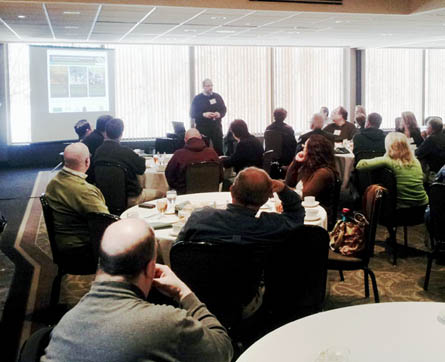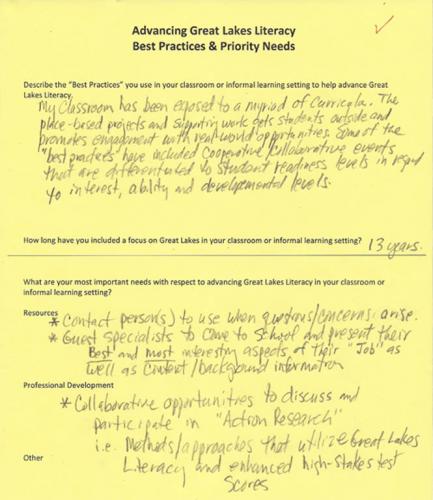Teachers report best practices at the MSU Great Lakes Conference
Teachers attending the 2013 Great Lakes Conference at Michigan State University shared their best practices, and their needs, regarding Great Lakes Literacy education.
In March, more than thirty Michigan teachers were among the 224 attendees at the 2013 Great Lakes Conference, held at MSU’s Kellogg Center. They were the latest of more than 150 educators who have come to Michigan State University over the past five years to learn about issues affecting to the Great Lakes and research f indings used to address them. They participated in an Educator’s Luncheon, conducted by Michigan Sea Grant Extension and funded by a Great Lakes Restoration Initiative grant. At the luncheon, educators learned about upcoming professional development opportunities relating to the Great Lakes, and shared their best practices in Great Lakes education, as well as their priority needs relating to advancing Great Lakes literacy in the classroom.
indings used to address them. They participated in an Educator’s Luncheon, conducted by Michigan Sea Grant Extension and funded by a Great Lakes Restoration Initiative grant. At the luncheon, educators learned about upcoming professional development opportunities relating to the Great Lakes, and shared their best practices in Great Lakes education, as well as their priority needs relating to advancing Great Lakes literacy in the classroom.
So with the goal of advancing Great Lakes literacy in mind, what were some of their best practices and needs that emerged from the teacher discussion? The best practices clustered around five themes: 1) curriculum, 2) place-based education, 3) data in the classroom, 4) hands-on learning, and 5) cross-curriculum lessons. Examples of these best practices include:
Curriculum: “Most of my work has involved teacher education through the Michigan Teacher Excellence Program. I've used the Great Lakes literacy principles with the teachers in the cohorts to develop lesson study groups to promote the lakes.”
Data in the classroom: “I have made sure to use research articles (common core ELD benchmark) so that students learn about different aspects of my science curriculum. Specifically, articles from the R/V Lake Guardian educator workshop on formation and geology of the Great Lakes, and fisheries relationships.”
Place-based educati on: “I teach about watersheds and use the Great Lakes as the main example. Since attending the previous Great Lakes conference, I now add more to topics such as invasive species, harmful algal blooms, weather, etc., that I learned more of as a result of attending.”
on: “I teach about watersheds and use the Great Lakes as the main example. Since attending the previous Great Lakes conference, I now add more to topics such as invasive species, harmful algal blooms, weather, etc., that I learned more of as a result of attending.”
Hands-on learning: “The Great Lakes Education Program is the most impactful opportunity in my science program. It has personal appeal to students and provides a unique setting for students to learn. I know from "alumni" experience that participants retain much of what they learn. The pre/post trip materials also contribute to the positive experience.”
Cross-curriculum lessons: “We look at not just the direct, but also indirect impacts of the Great Lakes on Michigan's economy. With cross-curriculum lessons, I include the economic and natural science impacts the Great Lakes have on Michigan.”
As for their needs, educators identified both resource needs and professional development needs. The most common resource needs cited were funding, time, technology, curriculum, current issues, and timely data. With respect to professional development needs, the priorities were access to scientists, more opportunities such as the Great Lakes Conference, curriculum training, and connecting with other teachers who focus on Great Lakes literacy.
Michigan State University Extension and Michigan Sea Grant will continue to work hard to meet the needs of Michigan educators. This will occur by working with collaborators (such as the Michigan Science Teachers Association) and school districts across the state, providing connections to the research community through the Center for Great Lakes Literacy, and by providing teacher training through the Great Lakes Education Program and Great Lakes Science for Teachers workshops. The Great Lakes define Michigan – let’s continue to learn about them!



 Print
Print Email
Email




